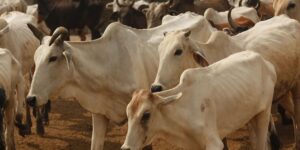
The National Dairy Research Institute (NDRI), Karnal, has initiated work to harness the milk potential of non-bovine species for human nutrition and health.

At first, scientists at the institute under Indian Council of Agriculture Research (ICAR) said that the goat and camel milk are being explored for the probiotic non-bovine fermented foods and are being analysed for the prevention of allergies, autism, diabetes, etc.
The institute has also initiated work on cheese-making from goat and sheep milk that has increased worldwide.
“Sheep milk is very thick and contains more solids (15-16%) as compared to cow or goat milk, and this is ideal for making ice cream, dried milk, cheese and yoghurt,” the NDRI said.
The scientists are also working on camel’s milk, which is a super food enriched with minerals and is rich in Vitamin B3 that supports the functioning of the digestive system, skin, and nerves.
Dr Dheer Singh, director and vice-chancellor of NDRI, said composition and physicochemical properties of milk obtained from different species have evolved to meet the requirements of their offspring, but has now also been explored for additional health benefits for infants, children, and adults of humans, beyond their basic nutritional role.
“Non-bovine milk of animals such as goats, sheep, camels, donkey, yaks etc. possesses numerous therapeutic properties which are considered good for human health, but these species have not received much attention over the years. This milk contains a large amount of functionally active lipids, lactose, immunoglobulin, various peptides, nucleotides, oligosaccharides and metabolites. Their milk also has some unique microbial properties, which need to be exploited for improving human health,” he said.
Dr Singh said that NDRI has already identified some health promoting milk bio-active peptides and the institute will further validate these peptides to determine the therapeutic properties of milk obtained from them.
“Clinical trials on non-bovine milk and identification of unique metabolites to be used as biomarkers for monitoring quality is important to further carry out this work. The NDRI has taken an initiative in collaboration with other institutes working on the milk of their animals,” he added.
The director believes that characterization of milk constituents of non-bovine milk needs to be taken up on priority at national level as this will go a long way in the diversification of milk for the development of healthier and nutritious products and also be a source of income to farmers rearing these animals.




